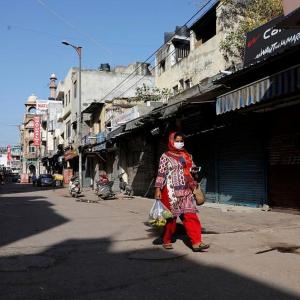Making a case for an optimal fiscal stance, the Economic Survey on Friday said growth leads to debt sustainability and not necessarily vice-versa.

"This is because debt sustainability depends on the 'Interest Rate Growth Rate Differential' (IRGD) i.e. the difference between the interest rate and the growth rate in an economy.
"With the Indian context of potential high growth, the interest rate on debt paid by the Indian government has been less than India's growth rate by norm, not by exception," it said.
It suggested that sustainable debt-to-GDP ratio should be maintained over the next decade irrespective of growth and interest rate indicators.
The N K Singh committee to review Fiscal Responsibility and Budget Management (FRBM) has recommended bringing down the debt-to-GDP ratio of Centre and states to 60 per cent by 2023.
 The Survey said the phenomenon of a negative IRGD in India, unlike advanced economies, is not due to lower interest rates but much higher growth rates, prompting a debate on saliency of fiscal policy, especially during growth slowdowns and economic crises.
The Survey said the phenomenon of a negative IRGD in India, unlike advanced economies, is not due to lower interest rates but much higher growth rates, prompting a debate on saliency of fiscal policy, especially during growth slowdowns and economic crises.
With evidence from across several countries, the Survey said growth causes debt to become sustainable in countries with higher growth rates, and that such clarity about the causal direction is not witnessed in countries with lower growth rates.
The Survey, tabled by Finance Minister Nirmala Sitharaman in Parliament, also said India must continue to focus on economic growth to lift the poor out of poverty by expanding the overall pie given the country's stage of development.
"The relationship between inequality and socio-economic outcomes on one hand, and economic growth and socio-economic outcomes, on the other hand is different in India from that observed in advanced economies.
"Unlike in advanced economies, economic growth and inequality converge in terms of their effects on socio-economic indicators in India," it said.
The third Economic Survey of the Modi 2.0 government examined the correlation of inequality and per-capita income with a range of socio-economic indicators, including health, education, life expectancy, infant mortality, birth and death rates, fertility rates, crime, drug usage and mental health across Indian states.
The analysis showed that both economic growth and inequality have similar relationships with socio-economic indicators.
On the basis of the analysis, it said "economic growth has a far greater impact on poverty alleviation than inequality.
"Economic growth has been represented by income per capita at the state level."
However, the Survey said the policy objective of focusing on inequality may not apply in the Indian context given the differences in the stage of development, India's higher potential rate of economic growth and the higher absolute levels of poverty.
"Also, the examples of India and China have posed a striking challenge to this conflict.
"The growth stories of India and China have shown a significant reduction in poverty due to high economic growth," it said.
It said focus on policy of growth does not imply that the redistributed objectives are unimportant, but that redistribution is only feasible in a developing economy if the size of the economic pie grows.
For a developing country such as India, where the growth potential is high and scope for poverty reduction is also significant, the focus must continue on growing the size of the economic pie rapidly at least for the foreseeable future, it added.
The Survey also indicates that a well-designed expansionary fiscal policy stance can contribute to better economic outcomes in two ways.
"First, it can boost potential growth with multi-year public investment packages that raise productivity.
"Second, it can mitigate the risk of Indian economy falling into a low wage-growth trap, like Japan," it said.
Further, at a time of excessive risk aversion in the private sector, as seen during an economic crisis, risk-taking via public investment can catalyse private investment, leading to a crowding in, than a crowding out.
With the National Infrastructure Pipeline already laying out the agenda for ambitious public spending, fiscal policy catering to its funding can boost growth, productivity, generate higher-paying jobs and thereby be self-financing.
The National Infrastructure Pipeline (NIP) unveiled in April 2020 has projected total investment of Rs 111 lakh crore in infra projects over five years.
While emphasising that a more active, counter-cyclical fiscal policy is not a call for fiscal irresponsibility, the Economic Survey sought to break any asymmetric bias created against fiscal policy.









